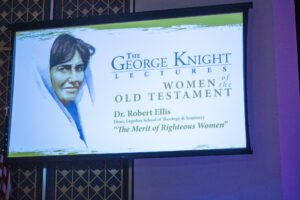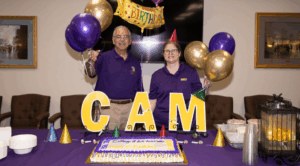Knight Lectures Highlight Women of the Old Testament

The annual George Knight Lectures typically feature one biblical scholar who gives three lectures. This year, three professors who were students of Dr. George Knight, honored his legacy with their lectures. Knight passed away in November 2018, shortly after last year’s Knight Lectures. Drs. Susan Pigott, Robert Ellis, and Meredith Stone gave lectures on women of the Old Testament on Oct. 28 and 29.
Dr. Susan Pigott
Dr. Susan Pigott, Professor of Old Testament and Hebrew, gave a lecture titled, “Text, Tradition, and Art: Re-envisioning Hagar’s Story.” Dr. Pigott’s lecture was based on her article “Hagar: The M/Other Patriarch,” published in Review & Expositor, a Baptist academic journal.
Dr. Pigott presented her own translation of Genesis 16, highlighting the ways traditional translations can be used to justify prejudices against Muslims and Arabs.
Pigott explained how Hagar was given a promise of multiplied seed, a promise only given to male patriarchs like Abraham elsewhere. Hagar was the first person in the Bible to encounter the angel, or messenger of the Lord. She was also the only person in the Hebrew Bible to give God a name, El Roi, “the God who sees me.”
“Hagar was a patriarch in her own right,” said Pigott. “She is a courageous heroine that should be celebrated.”
While many translations render God’s promise concerning Hagar’s son as a curse, Pigott’s translation views the prophecy as a blessing. Genesis 16:12 is often translated, “He will be a wild donkey of a man; his hand will be against everyone and everyone’s hand against him, and he will live in hostility toward all his brothers (NIV).” Citing different meanings of prepositions, Pigott translates the verse, “And he himself will be a wild-stallion-man. His hand will be with everyone and the hand of everyone will be with him. And in the presence of his brothers he will dwell securely.”
Pigott ended her lecture with two poems written from the perspectives of Hagar, Abram, Sarai, and the messenger of the Lord. The poems were performed by theatre students Dylan Scott, Kyrsten Roach, Arianna Reed, and Jake Hamilton. A video of the lecture is available on the HSU YouTube page.
Dr. Robert Ellis

The George Knight Lectures highlighted Women of the Old Testament.
Dr. Robert Ellis, Dean of the Logsdon School of Theology and Logsdon Seminary, spoke to the university about “The Merit of Righteous Women.” He cited a verse from the Talmud, which says that the Hebrews were redeemed from Egypt “through the merit of the righteous women of that generation.” Dr. Ellis told the stories of nine women in the Old Testament who showed courageous faith: Shiphrah, Puah, Jochebed, Miriam, Pharaoh’s daughter, Rahab, Deborah, Jael, and Ruth.
While Moses is often remembered as delivering the Israelites from the Egyptians, Dr. Ellis reminded the crowd that he would not have survived Pharaoh’s genocide if not for the Hebrew midwives, Moses’ mother and sister, and Pharaoh’s daughter. These women protected the innocent and vulnerable.
Dr. Ellis marveled that Rahab, a Canaanite and Baal-worshipping prostitute, rescued Hebrew spies and made a declaration of faith in God. Rahab’s family was saved because of her faith, and she was in the line of Jesus.
“God specializes in using broken people for his purposes, who have the courage to speak and act on behalf of others,” said Ellis.
In the book of Judges, Deborah and Jael show courageous deliverance for people who are being oppressed. Likewise, Ruth showed sacrificial loyalty that risked everything for someone who was in need. Dr. Ellis encouraged the crowd to be righteous women and men, acting on behalf of the oppressed like the biblical women who came before them. Dr. Ellis’ lecture is also available on the HSU YouTube page.
Dr. Meredith Stone
A power outage on campus was not enough to hinder Dr. Meredith Stone, Associate Dean for Academics for Logsdon Seminary, from delivering her lecture on Oct. 29. The crowd huddled together near the front of Logsdon Chapel to listen to Dr. Stone’s lecture titled, “Why the Empire Always Strikes Back: Reading Esther with Imperial-Critical Eyes.” Dr. Stone’s lecture was based on her book “Empire and Gender in LXX Esther.” She began with references to the Star Wars saga, explaining that the Star Wars universe is a paradigmatic story of people who are in power and people who are not. Both Star Wars and the book of Esther highlight the stories of the oppressed and how they negotiate power.
In the story of Esther, King Ahasuerus used all four structures of power to control his empire: military, economic, political, and ideological. However, the story’s characters respond to the king’s power in different ways, using flattery/deference, political disguise, and direct defiance. Queen Vashti directly defied the king by refusing to appear at his banquet. Mordecai showed deference by alerting the king of the plan to kill him. Esther disguised her true motives as a voice under domination. As a woman, she would not be suspected to defy the king. Esther successfully saved her people by convincing him that killing the Hebrews would make him look bad. Thus, she used the king’s lust for power against him to achieve her purpose.
“Scripture teaches us about the unseen, spiritual world,” said Stone. “But it also teaches us about the realities of the physical world of power and negotiation of power.” Dr. Stone’s lecture is available here.


